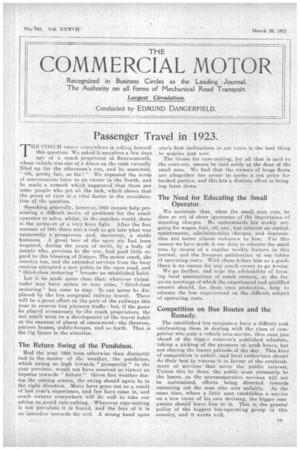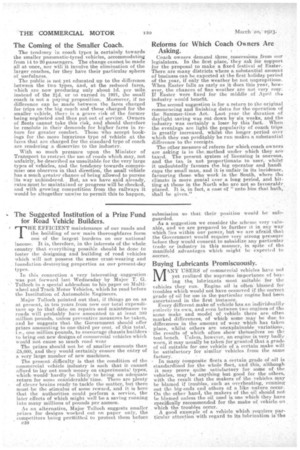Passenger Travel in 1923.
Page 1

Page 2

If you've noticed an error in this article please click here to report it so we can fix it.
T11E COACH. owner everywhere is askieg himself this question. We asked it ourselves a few days ago of a coach Proprietor at Bournemouth, whose vehicle was one of a dezen on the rank virtually filled up for the afternoon's run, and he answered, " Oh, pretty fair, so far ! " We repeated the *scrap of conversation later to an owner in the North, and he made a remark which suggested that there are some people who get all the luck, which shows that the point of view is a vital factor in the considera
tion of the question. . ...
.Sa:Taking, generally, however, 1922 cannot help presenting a difficult series of problems for the coach .operator to solve, whilst, in the, omnibus world, there is the prospect of a very keen fight. After the fine summer of 1921 there was a rush to get into -w-hat was apparently .a prosperous and, moreover, a stable busineis A great love of the open air had been
• acquired, during the years of strife, by a body of People who, previous to the war, had paid little regard to this blessing of Nature. The motor coach, the country bits, and the extended services from the busy centres attracted a new public to the open road, and " third-class motoring" became an established habit.
Let it be made quite clear that, whatever vicissitudes may have arisen or may arise, " third-class motoring" has come to stay. It can never be displaced by the less congenial railway travel. There will be a great effort on the part of the railways this year to recover lost pleasure traffic ; but, if the game be played strenuously by the coach proprietors, the net result must be a development Of the travel habit at, the expense of places of amusement—the theatres, picture houses, public-houses, and so. forth. That is the big factor in the situation:
The Return Swing of the Pendulum.
Had the year 1922 been otherwise than distinctly bad in the matter of the weather, the pendulum, which swung so_ high towards" prosperity" in -the year previous, would not have received so violent an impetus towards " failure.". Given fine weather during the coming season, the swing should again be in the right direction. .Many have gone out as a result of last year's experience, and few have come in, and coach owners everywhere will do well to take our advice to avoid rate-cutting. Wherever rate-cutting is not Prevalent it is feared, and the fear a it is an incentive towards the evil. A strung hand upon
one's first inclinations to cut sates is the best thing to acquire just now.
• The blame for rate-cutting, for all that is said to the contrary, cannot be laid solely at the door of the small man. We find that the owners of large fleets are altogether too prone to quote a cut price for booked parties, and this has a distinct effect inbringing.fares down.
The Need . for Educating the Small Operator.
We maintain that, when the small man cuts, be does so out of sheer ignorance of the importance of standing charges. He understands his weekly out going for wages, fuel, oil, etc., but interest on capital, maintenance, administration charges, and depreciation are terms almost unknown to him. -For this reason we have made it our duty to educate the small man by_ means of a regular weekly feature in this journal, and the frequent publication of our -tables of operating costs. With these before him as a guide there is no exeuse for any coach owner to go wrong.
We go farther, and urge the advisability of forming local associations of coach owners, at the frequent meetings of which the experienced and qualified owners should, for their own protection, help to educatn the less experienced on the difficult subject of operating costs,
Competition on Bus Routes and the Remedy. •
The established bus companies have a difficult task confronting them in dealing with the class of competitor who puts a vehicle into service, then runs just ahead of the biggcr concern's published schedule, taking a picking of the pressure at' peak hours, but not sharing the leaner periods of the day. This kind of competition is unfair, and local authorities should do their best to repress it in favour of the establishment of services that serve the public interest.
• Unless this he done, the public Must ultimately be the losers, as the unremunerative services will not be maintained, efforts being directed towards squeezing out the man who acts unfairly. At the same. time, Where a little man establishes a, service on a new route of his own devising, the bigger companies should leave him to it. This is the general policy -of the biggest lolls:Operating group in this country, and it works well.
The Coming of the Smaller Coach.
The tendency in coach typos is certainly, towards the smaller pneumatic-tyred vehicles, accommodating from 14 to 20 passengers. The change cannot he made all at once, nor will it involve the elimination of the larger coaches, for they have their particular sphere of usefulness. The public is not yet educated up to the difference between the two types, and, at the reduced fares, which are now producing only about id. per mile. instead of the 2id, or co earned in 1921, the small coach is not a paying proposition. Moreover, if no difference can be made between the fares charged for trips on the big coach and those charged for the smaller vehicle, there is a grave risk of the former being neglected and thus put out of service. Owners of fleets cannot take this risk, and should therefore be resolute in their demands for higher fares in return for greater comfort. Those who accept bookings for the. more luxurious type of vehicle at the fares that are charged for the standard type of coach are rendering a disservice to the industry. With so much pressure upon the, Minister of Transport to restrict the use of roads which may, not unfairly, be described as unsuitable for the very large types of vehicles, and the tendency towards compromise one observes in thatdirection, the small vehicle has a much greater chance of being allowed to pursue its way unhindered. But, as we have said already, rates must be maintained or progress will be checked, and with growing competition from the railways it would be altogether unwise to permit this to happen.
Reforms for Which Coach Oviners Are. Asking.
Coach owners demand three concessions from our legislators. In the first place; they ask for support for the proposal to make a fixed festival of Easter. There are many districts where a substantial amount of business can be expected at the first holiday period of the year, if only the weather be not unpropitious. When Easter falls as early as it does this year, however, the chances of fine weather are not very rosy. If Easter were fixed for the middle, of April the industry would benefit.
The second suggestion is for a return to the original commencing and finishing dates for the 'operation of the Summer-time Act. Last year the duration of daylight saving was cut down by six weeks, and the industry was certainly a loser by this -fact. When the evenings are light the popularity of coach trips is greatly increased, whilst the longer period over which they can profitably be run makes a substantial difference to the receipts. The other measure of reform for which coach owners are asking is in the method under which they arc' taxed. The present system of licensing is onerous, and the tax is not proportionate to user,whilst it undoubtedly favours the big operator and handi caps the small man, and it is unfair in its incidence, favouring those who work in the South, where tho climate is more genial over a long Period, and hitting at those in the North who are not so favourably. placed. It is, in fact, a case Of "unto him that bath, • shall be given."




















































